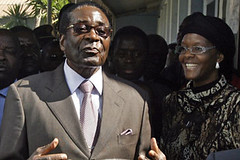
President Robert Mugabe and First Lady Amai Grace in Zimbabwe which held a peaceful run-off election amid continuing threats from the US, UK and other imperialist countries and their allies in the region.
Originally uploaded by Pan-African News Wire File Photos
By Lloyd Gumbo
THE constitution-making outreach programme has been suspended indefinitely following disagreements on the composition of the team that should collect views from the grassroots.
The process has also been stymied by a funding crunch and at the time of writing it was not clear when normal business would resume.
Reliable sources in the Constitutional Parliamentary Select Committee on Tuesday said they had failed to agree on the number of rapporteurs to accompany the outreach teams.
It is also understood that there is feuding over who should be a rapporteur with some members of the management committee saying all of them should be bound by oaths of secrecy.
The management committee is made up of negotiators to the Global Political Agreement, Cde Patrick Chinamasa (Zanu-PF), Mr Tendai Biti (MDC-T) and Professor Welshman Ncube (MDC), and members of the Select Committee.
The sources said some members had suggested 210 rapporteurs with each party contributing 70, while others wanted 70 only.
Seventy outreach teams are supposed to go round the country collating people’s views but disagreement over who will actually write these views down has become the latest sticking point.
Select Committee co-chairpersons Cde Munyaradzi Paul Mangwana (Zanu-PF) and Mr Edward Mkhosi (MDC) confirmed the outreach was now on the back burner and were not certain when the programme would start.
They said all constitution-making programmes were suspended by the management committee until next week when it meets to discuss the financial situation and other administrative issues.
The management committee, they said, had indicated that it was better to delay the process than rush to produce a "half-baked" product.
"All constitutional programmes have been suspended by the management committee. They felt there were other issues which needed attention before the outreach programme begins.
"There are still disagreements on the composition of rapporteurs, but there are other more pressing issues, which have to be addressed like financial constraints.
"Recording equipment is yet to be bought, cars haven’t been mobilised and rapporteurs are yet to be trained.
"Therefore, we cannot give a timetable of when the actual outreach will start because some of the issues are beyond our control as the Select Committee," Cde Mangwana said.
He said the committee was going to engage the United Nations Development Fund and other financiers who pledged to bankroll the programme.
Cde Mangwana said pledges fulfilled so far were enough to train outreach teams and parliamentarians but insufficient to kick-start the actual outreach.
He said there was a possibility of the programme being moved to February depending on the availability of funds.
Mr Mkhosi added that finances were a major stumbling block in getting the process off the ground.
He said the management committee had asked the Select Committee to present an evaluation report on the latest developments.
"The report which has been requested by the management committee will help
determine when the outreach programme will start.
"The evaluation will include financial and administrative issues. The way forward will be determined after the management committee meeting next week," Mr Mkhosi said.
Finance Minister Biti allocated US$43 million for the process in the 2010 National Budget, with funding coming largely from donors.
The Select Committee has so far received about US$4 million, while a US$18 million pledge from the UNDP will be disbursed in phases.
The constitutional programme appeared to have gathered momentum with the identification and training of thematic committee chairpersons, their deputies and outreach teams early this month.
However, the process remains behind schedule.
The GPA calls for a new constitution ahead of fresh elections with the process scheduled for completion in 18 months.
This means a constitutional referendum should ideally be held around June this year but this is now highly unlikely to happen.
No comments:
Post a Comment